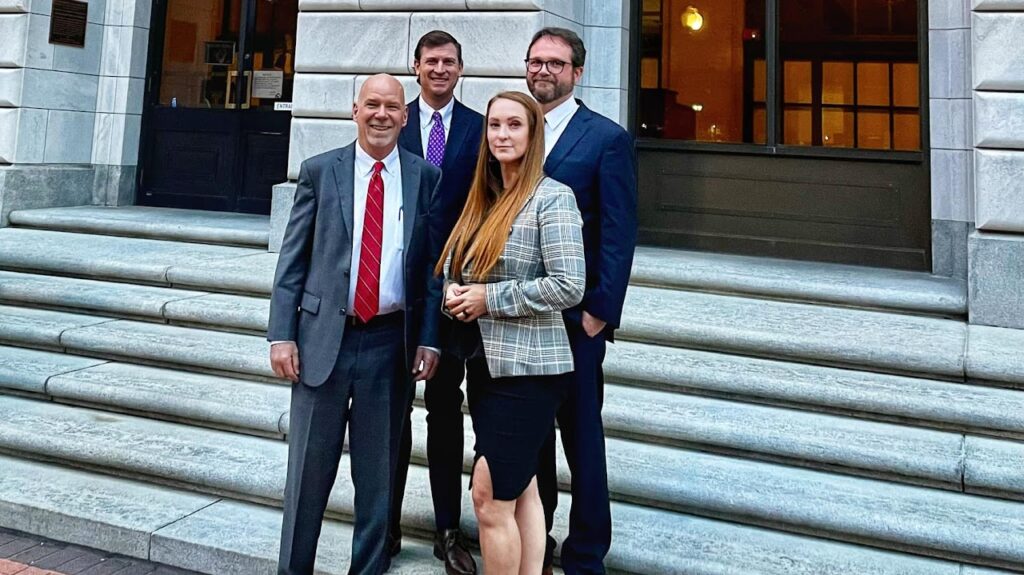
Louisiana Gun Laws 2024
Disclaimer: The information below may not be completely up-to-date, as gun laws often change. Please verify the accuracy by checking directly with government websites or by contacting law enforcement. Also, read our full legal disclaimer before proceeding.
The core purpose of Louisiana’s gun laws is to uphold public safety. By ensuring, through the use of background checks, permit requirements and restrictions against certain types of firearms, that firearms are accessible only to those who can legally possess them and who are able to responsibly use them, these laws prevent crime and reduce gun violence.
That said, Louisiana’s gun laws balance that obligation to preserve public safety against the preservation of individual rights as guaranteed under the U.S. Constitution. Well-defined laws outlining this balance provide not only clarity for law enforcement and citizens, but also protection for legitimate firearm uses, from self-defense to recreational sport shooting.
In the following guide, you’ll gain an understanding of Louisiana’s complex laws governing firearms and their usage. By better understanding these laws, you’ll be better suited to make smart decisions regarding firearms and less likely to run into legal issues. If, however, you should find yourself facing a weapons-related charge, know that there are legal protections that could help you see your charges reduced or dismissed.
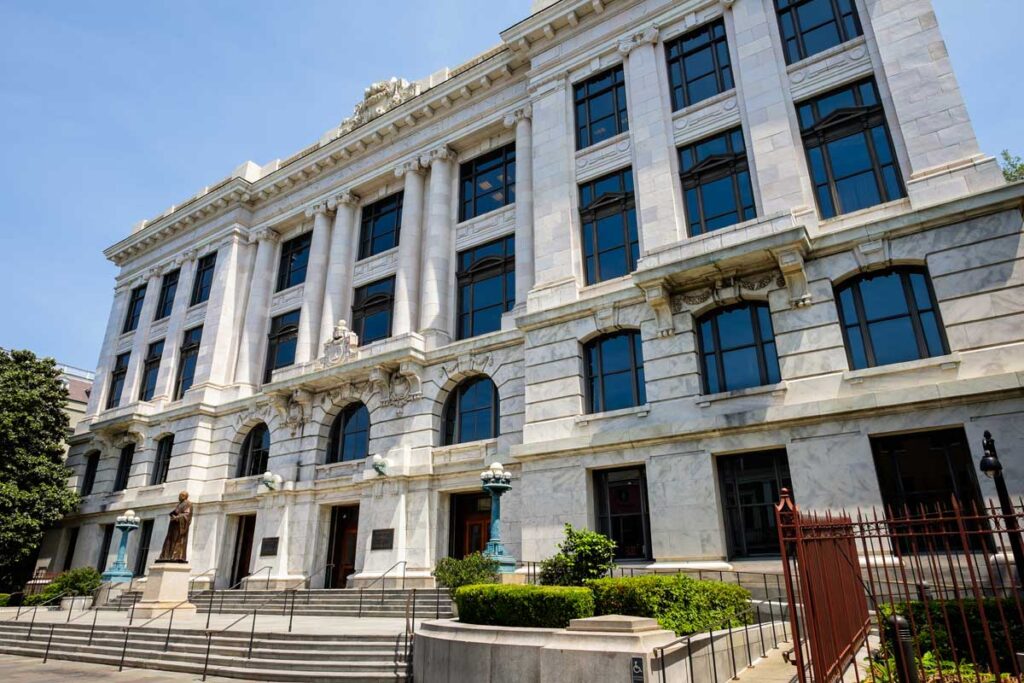
Louisiana’s Concealed Carry Laws
Beginning on July 4, 2024, Louisiana law will no longer require a permit to carry a concealed weapon. Until then, only those who are 21 years or older who have been issued a Concealed Handgun Permit (CHP) may legally carry a concealed firearm. In order to receive a CHP, applicants must first complete a course in firearm safety, pass a background check and meet several other criteria as defined by the state.
Those applying for a permit must submit all required documentation and a new set of fingerprints to the Louisiana State Police website. For those applying for the first time, or for those whose previous permit expired more than 60 days ago, all materials go to the Louisiana State Police Concealed Handgun Permit Unit in Baton Rouge.
These materials will include a copy of your state-issued Louisiana ID, plus documentation regarding any recent divorces and/or name changes, criminal history if any, military service standing or medical history if needed.
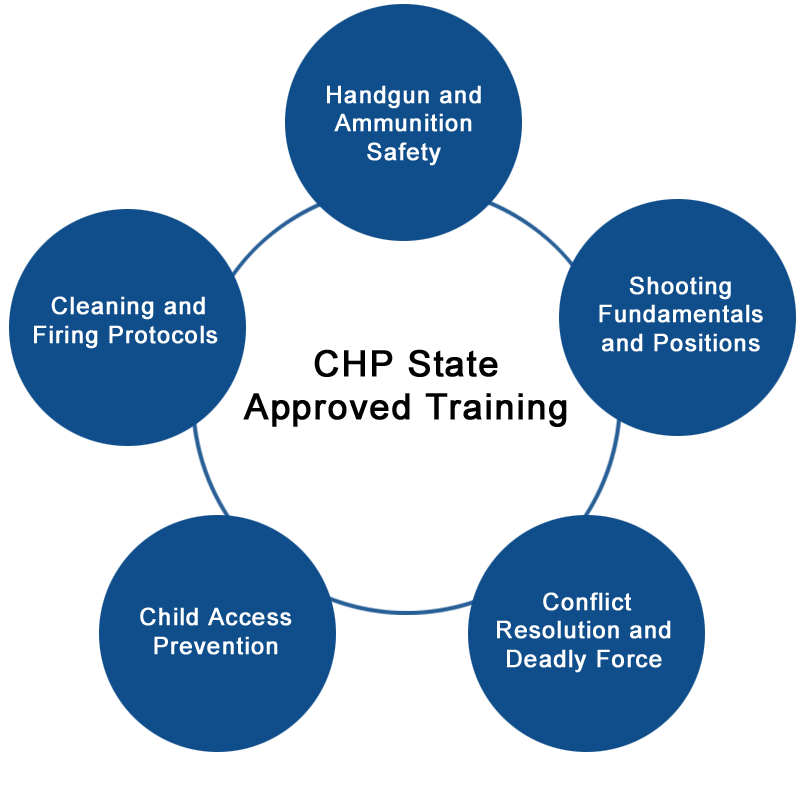 Whether renewing a CHP or applying for a new one, applicants are required to undergo state-approved training including:
Whether renewing a CHP or applying for a new one, applicants are required to undergo state-approved training including:
- • Safety in handling both handguns and ammunition
- • Fundamentals and proper positions for shooting
- • Conflict resolution and use of deadly force
- • Preventing children from accessing handguns
- • Proper cleaning and live firing protocol
Because the process of acquiring a CHP is so thorough, the law requiring it helps ensure that those carrying concealed firearms have been vetted for public safety and trained in proper usage. Once a CHP has been obtained, it must be renewed every 5 years unless a lifetime permit has been issued. Check with Louisiana State Police for the most up-to-date information as the new regulation goes into effect.
Carrying In Louisiana for Those From Out Of State
According to Louisiana law, specifically, R.S. 40:1379.3(T)(2), those traveling in Louisiana from other states must have a permit or license from their home state. If they are older than 21 years of age, and have a valid out-of-state permit from a state recognized via reciprocity by the state of Louisiana, their permit shall be considered a valid permit within state lines.
This reciprocity agreement between states allows those with valid Louisiana permits to legally carry in participating states, while allowing citizens of those states to legally carry in Louisiana. These states include:
Alabama, Alaska, Arizona, Arkansas, Colorado, Florida, Georgia, Idaho, Indiana, Iowa, Kansas, Kentucky, Maine, Michigan, Minnesota, Mississippi, Missouri, Montana, Nebraska, Nevada, New Hampshire, North Carolina, North Dakota, Ohio, Oklahoma, Pennsylvania, South Carolina, South Dakota, Tennessee, Texas, Utah, Vermont, Virginia, Washington, West Virginia, Wisconsin, Wyoming
States that do not have a reciprocal agreement with the state of Louisiana include:
California, Delaware, Hawaii, Illinois, Maryland, Massachusetts, New Jersey, New Mexico, New York, Oregon, Rhode Island
(NOTE: Louisiana does not have a reciprocity agreement in place with the state of Connecticut). It’s important to note that, even in reciprocal states, the regulations of the state you’re in dictate the law regardless of your state of origin.
Restrictions on Gun Ownership in Louisiana
Louisiana law does reserve prohibitions on certain individuals from owning guns. These individuals can include those with criminal convictions for crimes such as domestic violence, those with felonies on their record, or those who have been served with restraining orders for threats of violence. In addition, those who have been dishonorably discharged from the military, those with a history of drug abuse or those deemed mentally incompetent by the law may be prohibited from owning a firearm.
In addition to restrictions against gun ownership, these individuals may find themselves unable to carry a concealed weapon in the state of Louisiana. Likewise, those younger than 21 years of age or those with a permit from a non-reciprocal state may be barred from carrying a concealed weapon.
In addition to barring those individuals from carrying a concealed weapon, Louisiana law also proscribes several places and situations in which citizens are restricted from carrying a handgun.
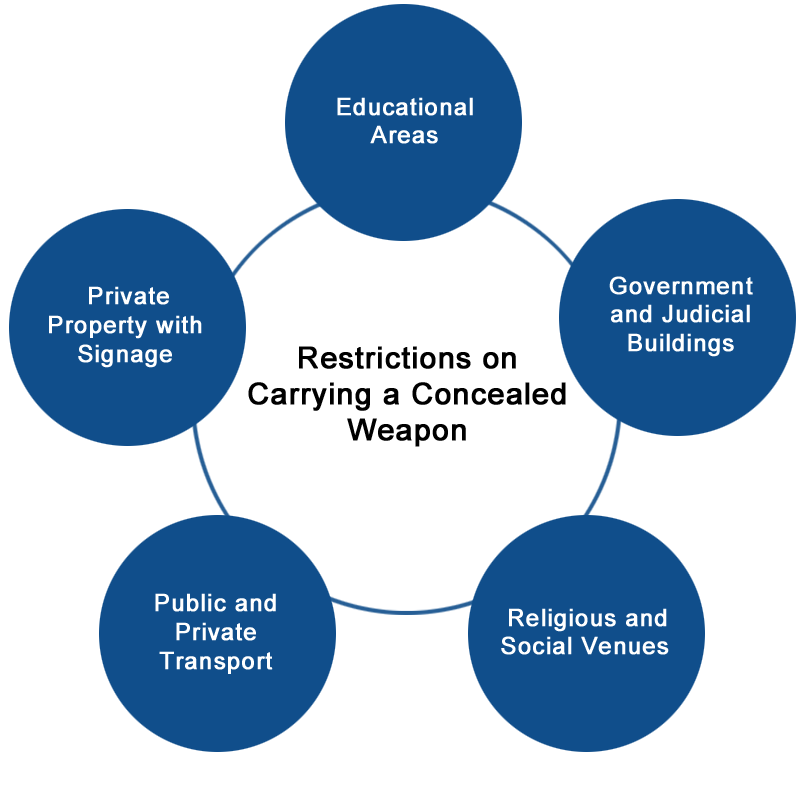 Restrictions on Carrying a Concealed Weapon in Louisiana
Restrictions on Carrying a Concealed Weapon in Louisiana
While Louisiana law allows for concealed carry in most public places with the proper CHP (until July 4, 2024), there are certain places where it is restricted. These include:
- • Schools or educational centers
- • School buses
- • Government buildings
- • Courthouses
- • Polling places
- • Religious establishments
- • Bars
- • Public transportation (civilians only)
- • In a taxi or a rideshare
- • Private property such as stores and restaurants where posted signage prohibits weapons
This is in addition to any property which has been designated a gun-free zone under federal law. While these include places such as airports, federal buildings, and military facilities, the Gun-Free School Zones Act specifies an area within a distance of 1,000 feet from a school as a gun-free zone. Educate yourself on local laws to determine where you can and cannot carry a concealed weapon, and always respect any posted signs.
You are allowed to keep a firearm in your own vehicle, as legally it is considered an extension of your home, even when on public roads. However, it should be common practice to keep it safely secured within the vehicle, such as in a locked glove compartment, to avoid unauthorized access or accidental discharge while driving.
Beyond certain areas that have been designated gun-free by state and federal law, there are also certain situations in which carrying a concealed weapon is prohibited. These include:
While Under the Influence: It is illegal under Arizona law to carry a concealed handgun while under the influence of either alcohol or drugs, as intoxication can impair judgement, slow reaction time and increase the danger to the general public.
During Special Events: In cases of special events that are hosted under a government permit, such as a Mardi Gras parade, or even at concerts at private venues, there may be special restrictions against concealed carry. Generally, it will be prohibited in areas where alcohol is served, so pay attention to event signage. Special ordinances may apply in high-volume tourism areas like The French Quarter, so follow local law.
While Underage: Louisiana law prohibits those under 17 years of age from possessing a handgun. However, there are specific exceptions to this rule, such as when the minor has been given written permission from a parent or guardian, is practicing at a shooting range, is taking a firearm safety course, or is hunting with a license.
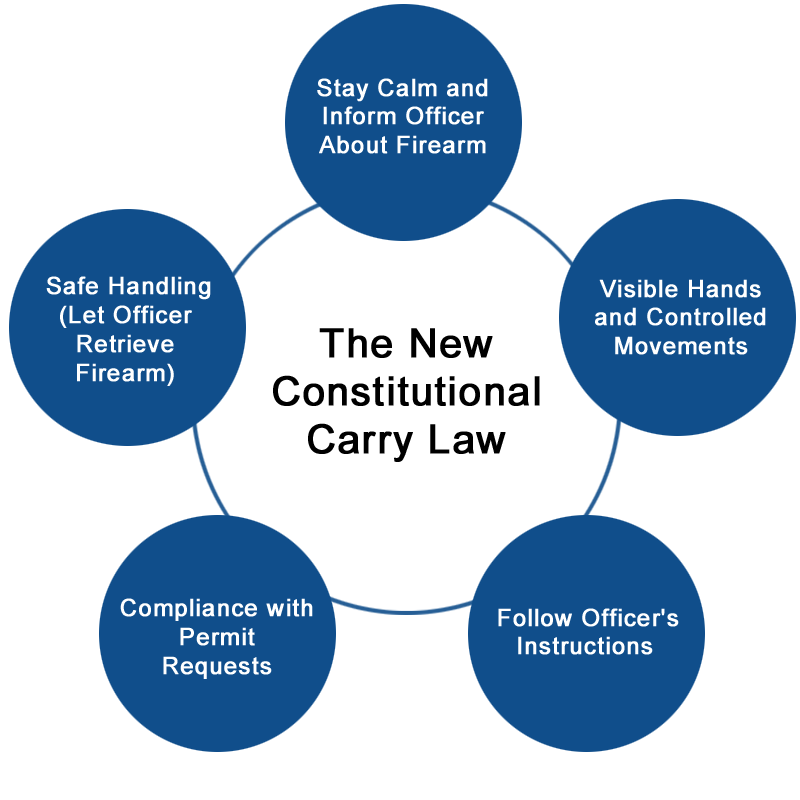 The New Constitutional Carry Law
The New Constitutional Carry Law
Under the new Constitutional Carry (or Permitless Concealed Carry) Law which goes into effect on July 4, 2024, anyone over the age of 18 may own and carry a concealed handgun without a permit or any kind of training. As much as this new law will expand on Second Amendment rights, it does pose a challenge to law enforcement as it could potentially impact public safety through an increase in crime.
It also poses challenges to gun owners who may not yet have a full understanding of the law, such as what legal issues they may face if stopped by a member of law enforcement while driving. If you find yourself in a traffic stop while carrying a concealed handgun, simply do the following:
- • Stay Calm
- • Inform the officer immediately of your firearm and where it is located.
- • Keep your hands visible and avoid sudden movements.
- • Follow any instructions given by the officer.
- • Heed any request to show your firearm permit.
- • If asked to produce the firearm, allow the officer to retrieve it for you.
Following these instructions will allow greater safety and clearer communication between yourself and law enforcement.
While this new law does change the circumstances surrounding concealed carry, it does not negate any of Louisiana’s prior firearm safety laws. You are not required to register handguns, rifles, or shotguns, for example, but may choose to do so to provide proof of ownership or aid in the recovery of a lost or stolen firearm. In order to purchase a firearm, you must still be 21 to purchase a handgun from a licensed dealer or 18 to purchase a rifle or long gun in a private sale. You must still pass a background check and not have any disqualifying factors such as a felony conviction.
A Glossary of Firearm Terms
The following helps define some of the more common terms used in relation to discussions surrounding gun laws.
Constitutional Carry: Suggesting that the Second Amendment provides freedom to bear firearms, Constitutional Carry is a legal framework that eliminates government-issued permits and allows states to permit the carrying of handguns without a license.
Permitless Concealed Carry: A subcategory within the framework of Constitutional Carry, this type of law focuses entirely on carrying a concealed firearm without a permit (as opposed to “open carry”).
Open Carry: Whether with or without a permit, the act of carrying a firearm in a way that is visible to other people is termed “open carry” in contrast to concealed carry. A common framework among states is to allow for openly carrying legally owned firearms in public, but specific restrictions may apply.
Concealed Carry: This is the act of storing a firearm on your person so it is not visible to others, such as holstered beneath clothing or tucked into garments. In most states, including Louisiana prior to July 4, 2024, this required a state-issued permit granted only after background checks and training had been completed.
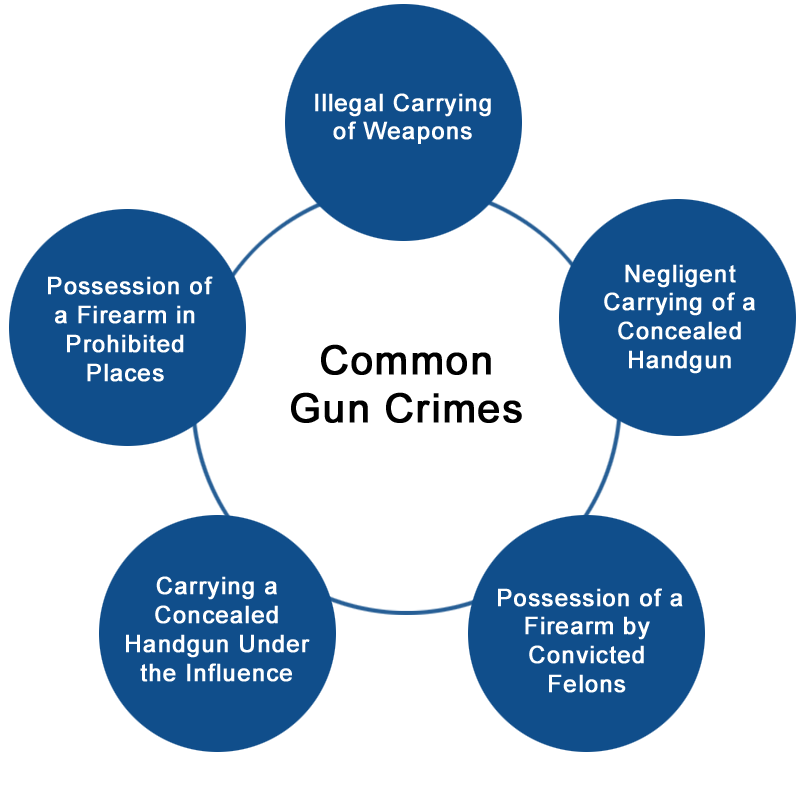 Common Gun Crimes
Common Gun Crimes
Even with the new law going into effect on July 4, 2024 relaxing restrictions on permitless carry, there are still legalities surrounding the use and ownership of firearms under Louisiana law. A few of the more common criminal violations involving guns include:
Illegal Carrying of Weapons: While one proviso of this law will soon go away under new laws, the Louisiana statute governing the illegal carrying of weapons describes penalties for enemy aliens found carrying a weapon, those found carrying a weapon on school campuses or buses, and those found in possession of “tools, or dynamite, or nitroglycerine, or explosives, or other instrumentality customarily used by thieves or burglars.” Violating this law can lead to a prison sentence of up to six months and fines of up to $500, with higher penalties for violations occurring during the commission of a crime or following prior convictions.
Negligent Carrying of a Concealed Handgun: Under Louisiana law, Negligent Carrying of a Concealed Handgun defines negligent carrying as carrying a weapon in a situation where it is possible the gun may discharge or when it is being carried in a way in which a reasonable person may think a crime is being committed. These charges can be issued via summons rather than physical arrest, with the arresting officers having the option to seize the handgun in question. Penalties include up to six months in prison and a $500, along with the potential loss of a handgun, permit or license.
Possession Of Firearm Or Carrying Concealed Weapon By A Person Convicted Of Certain Felonies: As proscribed under Louisiana law, this section explicitly prohibits certain types of felons from owning or concealing a weapon. Felonies described in the law include convictions for burglary, violent crime, weapons crimes, sex offenses, drug-related crimes or “manufacture or possession of a bomb.” In addition, those who have been convicted of domestic violence crimes or who are under a protective order may not possess a firearm. Those found in violation of this statute can face a prison sentence between 5-20 years without parole, probation or suspension, as well as fines ranging from $1,000-$5,000.
Carrying a Concealed Handgun Under the Influence: This section of the law is very clear about the consequences that face those found to be concealing a handgun under the influence of controlled dangerous substances or alcohol, setting the legal Blood Alcohol Content (BAC) at .05%. Meeting those conditions, or refusing testing of blood or urine, will result in a six-month revocation of CHP as well as further legal ramifications including jail time and fines that can reach hundreds of thousands of dollars. As the exact sentencing is subject to a judge’s discretion, they can vary wildly based on circumstances.
Possession of a Firearm in Prohibited Places: This includes any of the aforementioned sites that are considered gun-free zones such as schools, bars, courthouses and government buildings.
Use of a Firearm in the Commission of a Crime: This enhances penalties that would come from the conviction for the crime in question.
Illegal Sale or Transfer of Firearms: The law spells out the specific channels through which a person can legally sell a firearm, with penalties for those who violate those statutes, e.g. by selling to a prohibited individual or by failing to execute a proper background check.
Modification or Manufacture of Firearms: Louisiana requires proper licensing for any manufacturer of handguns or other firearms. Unlicensed manufacture of a weapon, or illegal modification of a firearm (through conversion to automatic fire, for example), are both prohibited.
Discharging a Firearm in Public Places: Charges associated with this act include reckless endangerment, among others, issued when a person fires a gun in a public area without having legal justification for doing so.
Possession of Stolen Firearms: Carrying serious penalties, this offense applies to those who consciously purchase or possess a firearm they know to be stolen.
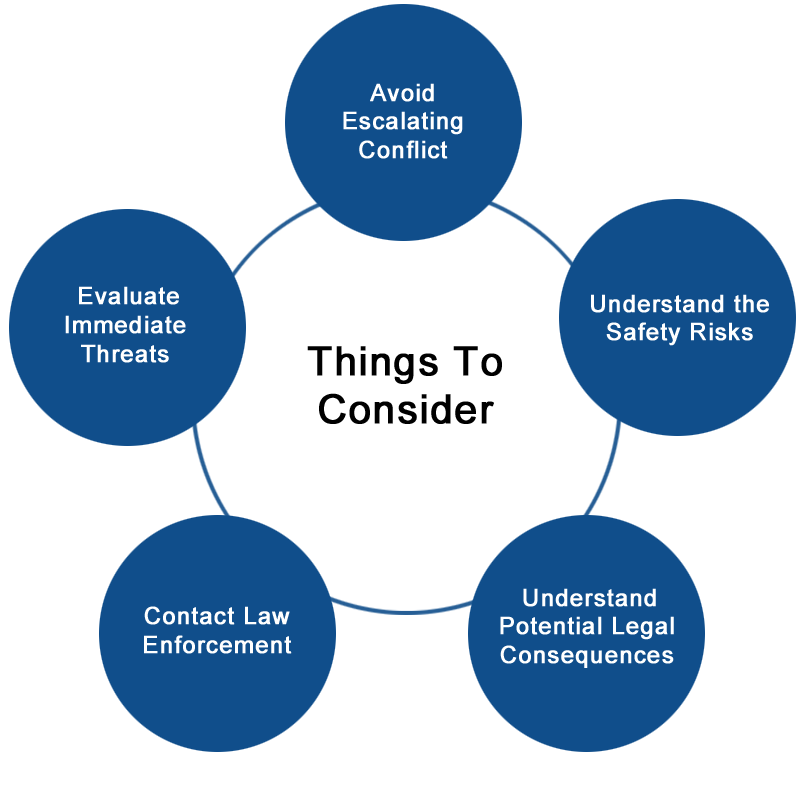 Things To Consider
Things To Consider
Most hope it never happens, but there may come a time when it becomes necessary to draw, and potentially fire, a firearm. Even those who have practiced firearm safety and follow proper procedures for owning and carrying firearms would do well to keep several factors in mind if they find themselves in this situation.
Avoid Escalating Conflict: A calm dialogue can often lead to a peaceful resolution through communication. Through this conversation and de-escalation, it is possible to avoid having to draw a firearm, which can elevate the situation’s overall risk.
Understand the Safety Risks: Using a firearm not only creates a risk to the person being perceived as a threat, it could potentially endanger the person who drew the weapon and any innocent bystanders in the immediate area.
Understand Potential Legal Consequences: Even those who are within their legal rights to own and carry a firearm could find that using that firearm could carry serious consequences including arrest and imprisonment.
The best method for avoiding a potentially deadly confrontation is to use any means possible to resolve the situation peacefully. If that fails, the next step should always be to contact law enforcement. There are situations, however, in which the threat to one’s own personal safety – and the safety of those around them – are being undeniably and immediately threatened.
In those situations, Louisiana law does provide certain protections for those who are compelled to act in self-defense. Two Louisiana statutes in particular that provide these protections are:
The Louisiana Castle Doctrine: Covered under Louisiana’s Justifiable Homicide laws, the state’s Castle Doctrine permits the use of deadly force against those who illegally enter a person’s home or vehicle as long as a reasonable belief exists that force is necessary.
Stand Your Ground Laws: As outlined in Louisiana’s laws concerning the use of force in defense, this legal statute says that as long as an individual is not committing a crime and is legally allowed to be where they are, they “shall have no duty to retreat before using force or violence as provided for in this Section and may stand his or her ground and meet force with force.”
Even with these laws working in your defense, it is still necessary to prove in a court of law that all conditions were met – that the threat to yourself or others existed, and that your use of force was justified in facing that threat. Because of the potential legal jeopardy it can cause, the use of a firearm should be considered a measure of last resort, used only when there is no option to retreat or de-escalate.
How We Can Help
If you’ve been accused of a gun crime, remember that you are still innocent in the eyes of the law until proven guilty. A robust legal defense can help illustrate that innocence, utilizing defenses ranging from arguing self-defense to proving procedural missteps by law enforcement. Because the complexity of gun laws allows several opportunities for crafting a defense, and because a conviction can have a long-standing impact on your life, it is vital that you choose a representative who knows Louisiana’s gun laws and will fight for you.
At the Claiborne Firm, we understand the impact a conviction can have on your rights to vote or own a firearm, as well as your ability to secure employment, housing or education. So we prepare a vigorous defense grounded in a framework of diligent research. We put every aspect of your case, from forensic evidence to police reports, under the microscope, subjecting it to the utmost scrutiny.
With that thorough knowledge base built, we take it to the prosecution, going after any inconsistencies in their case, dissecting any weaknesses and raising any issues with procedural mistakes. This knowledge can help us force a dismissal, acquittal or a reduction in charges before we ever have to step foot in a courtroom.
But if it comes to a criminal trial, we stop at nothing to ensure the best possible outcome, protect your freedom, and clear your good name. You don’t have to face the uncertainty of gun charges alone. Fill out your contact information below to schedule a free evaluation of your case.
Call (504) 294-8552 or Schedule a Free Case Evaluation Online
